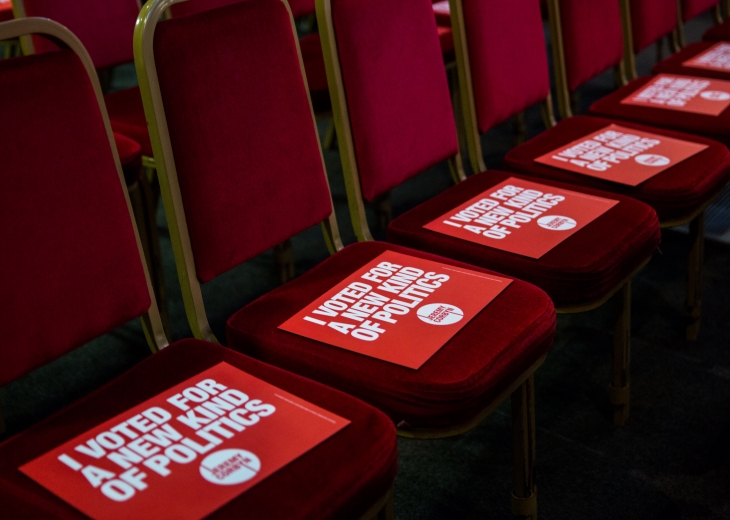Edit
Beyond Factionalism, although not today
Labour's current problem is that it can't stop talking about itself. How should Labour MPs make their mind up how to vote in the Commons? Whose advice should they take?
- The argument is about priorities, those who wish to build on the newly energised Labour Party with its 370,000 individual members and those who are still arguing about the platform debates that should have been resolved during the leadership election. The first of the following articles is very good although I feel the headline doesn't flag the content well. It explores the contest between Labour's new members and the (majority of ?) PLP and argues that the most important task for the Labour Party is to "absorb and mobilise" its new members with which I agree. I for one don't want to repeat the experience of 2010 when 60,000 people joined the Labour Party (for £1) to vote in the Leadership election and yet at the end of the year, Labour's membership was 30,000 below the number entitled to vote in that election. Making the new members feel welcome, busy and included must be the first priority and there is a massive thirst to be heard and listened to!
- The attacks on Momentum are designed to weaken the legitimacy of the canvassing and lobbying of the MPs and weaken the legitimacy of the voices of these new members. The article is balanced in its description of the debate over Syria and the way in which members and voters sought to ensure that their MPs knew their views.
 Jeremy Corbyn and Momentum must hold their nerveIn Baikonur in December, the average temperature is around -12C. Deep in the vast grasslands of the Kazakh steppe, it is a small relic of the former Soviet empire which lies 200 kilometres east of the Aral sea, just around the corner from nowhere in particular.
Jeremy Corbyn and Momentum must hold their nerveIn Baikonur in December, the average temperature is around -12C. Deep in the vast grasslands of the Kazakh steppe, it is a small relic of the former Soviet empire which lies 200 kilometres east of the Aral sea, just around the corner from nowhere in particular.- The current fracas focuses on the issues of accountability and security politics. The issues of Trident renewal and Bombing Syria are the parliamentary issues that make this most visible. These issues and this debate has led to a consideration by bth sides about the nature of Party MPs accountability to their party.
- There are many who argue that the/a Party whip interferes with an MP's ability to represent their constituents as they are instructed to vote against their conscience or judgement, but they're wrong, the whip is part of the contract an MP has with their electorate. They stand as a Party candidate and most of their voters expect them to take advice from their Party.
- For those falling back on Edmund Burke’s argument that MPs are representatives not delegates’ let’s remember that Burke was speaking before universal suffrage, before mass media, before compulsory education and before the internet. He was a conservative in a pre-democratic age, he has nothing to offer a modern democracy, and according to this article below, lost the election in which he first posed the ideas.
 Sorry, the role of an MP is to be a representative, not a delegate"I wonder," began the comment posted on my Facebook page last Friday. It was a gentle, almost contemplative start, but it didn't continue in that vein as 'David George' (supposedly of the north pole, Alaska) went on as follows: "I wonder how many of you and your child murdering friends have money invested in arms. Go suck on an exhaust pipe you fucking waste of cum.
Sorry, the role of an MP is to be a representative, not a delegate"I wonder," began the comment posted on my Facebook page last Friday. It was a gentle, almost contemplative start, but it didn't continue in that vein as 'David George' (supposedly of the north pole, Alaska) went on as follows: "I wonder how many of you and your child murdering friends have money invested in arms. Go suck on an exhaust pipe you fucking waste of cum.- The proposition that the MPs mandate is personal is dying. The decisions by Carswell and Reckless, (the UKIP defectors in the last Parliament) while to some extent based on personal survival were a recognition that when they crossed the floor, they owed it to their electors to ask their permission. This tradition has also been pursued in previous years famously by some members of the SDP and their forerunners. Equally famously, under the Labour Government, Shaun Woodward crossed the floor to Labour and Eric Joyce has the whip withdraw, in both cases without returning to their electors.
- These are all pieces of evidence that part of an MP's mandate is their a-priori declaration of their party allegiance. Despite its status as a zombie theory, plenty of Labour MPs are quoting neo-burkian ideas to justify their behaviour. MPs, MEPs and councillors need to remember who put them there. They need the party label to win, they've told the voters that it's part of the informal contract and with that comes the whip and reselection (via trigger ballots or otherwise).
- Accountability requires agreement and subscription to values and aims, the collective development of a programme, the democratic distillation of a manifesto and then we can chose candidates to implement the manifesto. It can't work the other way round, why would anyone join the Labour Party if it worked the other way round?
- This was written over the winter of 2015/2016, it was originally longer, it became diverted and so I pruned it. I published this in March 2016; the issues dealt with in this article have arisen again. The boundaries of acceptable opposition within a Party are being tested once again.
- Labour | Clause IV | Clause four | Clause 4Text of the current clause four from the Labour party constitution